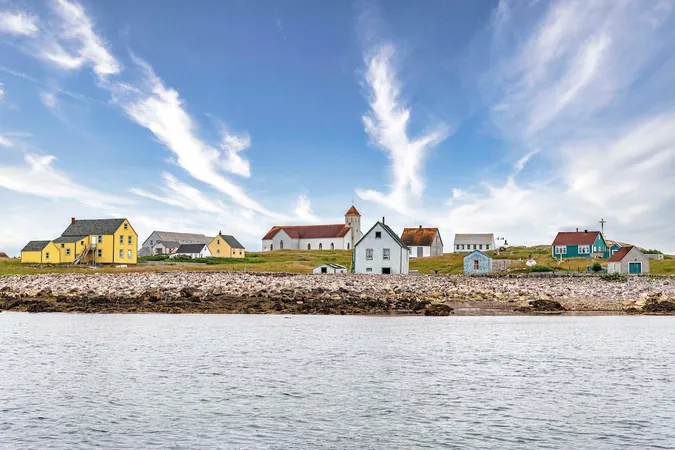
Trump’s Unexpected Tariff Target: A Tiny French Archipelago of 6,000 Residents
2025-04-07
Author: William
Introduction
Nestled off the southern coast of Newfoundland lies Saint-Pierre and Miquelon, a quaint archipelago made up of eight islands known more for their frosty weather and fog-shrouded landscapes than for any economic muscle. This French overseas territory, once infamous as a smuggling hub during the U.S. Prohibition era, has recently found itself thrust into the global spotlight, thanks to a staggering 50% import tariff imposed by President Donald Trump.
Historical Context
Historically, during the early 20th century, notorious gangsters like Al Capone turned these islands into their liquor-runnings paradise, trading bootlegged whisky for fish and other goods in a volatile dance of commerce. Fast forward to today, and the islands—home to just 6,000 residents—are grappling with the surprise impact of presidential trade policies.
Trump's Tariff Declaration
Last week, President Trump declared Saint-Pierre and Miquelon Public Enemy Number 1 in his escalating trade war. For Stéphane Lenormand, a retired history teacher and local representative in France’s National Assembly, this aggressive economic maneuver came as a shock. "It felt like a bad joke," he remarked, noting that the islands have little economic interaction with the United States and operate on a minuscule scale compared to global standards.
The Economic Impact
As Trump's tariffs extend to new and obscure territories, the decision to target such a remote locale has sparked questions. The sudden and severe tariff is matched in harshness only by Lesotho, a country on the opposite side of the globe. Analysts and local officials are left bewildered at how a tiny economy like Saint-Pierre and Miquelon could end up on such a list, especially when their trade statistics are underwhelming. For almost a decade, trade with the U.S. has barely registered, save for a surprising spike in June 2024, when a significant shipment of Atlantic halibut was exported to American buyers.
Geopolitical Tensions
The islands are also wrapped in a complex web of geopolitical tensions over fishing rights, especially with Canada, which complicates the context of their recent tariff troubles. A cycle of negotiations has been ongoing between France and Canada about fishing quotas, particularly concerning halibut and cod, revealing the convoluted nature of maritime economics in this part of the world.
Speculation on Tariff Targeting
Curiously, there are wild theories circulating about why Saint-Pierre and Miquelon caught Trump’s attention. Some suggest it could be linked to a satirical segment aired on French television about military production plans on the islands, a spoof that might have been misconstrued by the administration. Others speculate that there’s an undercurrent of resentment rooted in history, with a hint of revenge for the Prohibition-era escapades that once filled coastal bars with American spirits.
Local Concerns
Amid these revelations, residents are anxiously contemplating the consequences of being caught in Trump's tariff net. With most imports from the U.S. sneaking in through Canada, the local economy, already fragile and desperate for support from France, now faces uncertainty that could aggravate their cost of living.
Business Reactions
Local businesses are concerned too. Janick Cormier, the director of the local business association, is particularly apprehensive. "If the trade relationships with the U.S. sour, it will hurt our already vulnerable economy," she pointed out. The situation presents a unique challenge for the islands, which rely heavily on fishing along with some tourism and other small-scale industries.
Public Sentiment
As the residents of this remote yet culturally rich territory watch the unfolding drama, all they can hope for is that their lives won't be further complicated by tariff-induced economic woes. “Everyone is scared,” said José Alvarez, a bar owner who’s witnessed the ups and downs of Saint-Pierre’s local economy firsthand. “People may not voice it, but the anxiety is palpable.”
Conclusion
In a world of evolving trade dynamics, Saint-Pierre and Miquelon must navigate the murky waters of international relations all the while holding tight to their identity, culture, and economic stability. Will this minuscule economy weather the storm of Trump's tariff barrage, or will it drown in the rising tides of political discord? Only time will tell.









 Brasil (PT)
Brasil (PT)
 Canada (EN)
Canada (EN)
 Chile (ES)
Chile (ES)
 Česko (CS)
Česko (CS)
 대한민국 (KO)
대한민국 (KO)
 España (ES)
España (ES)
 France (FR)
France (FR)
 Hong Kong (EN)
Hong Kong (EN)
 Italia (IT)
Italia (IT)
 日本 (JA)
日本 (JA)
 Magyarország (HU)
Magyarország (HU)
 Norge (NO)
Norge (NO)
 Polska (PL)
Polska (PL)
 Schweiz (DE)
Schweiz (DE)
 Singapore (EN)
Singapore (EN)
 Sverige (SV)
Sverige (SV)
 Suomi (FI)
Suomi (FI)
 Türkiye (TR)
Türkiye (TR)
 الإمارات العربية المتحدة (AR)
الإمارات العربية المتحدة (AR)